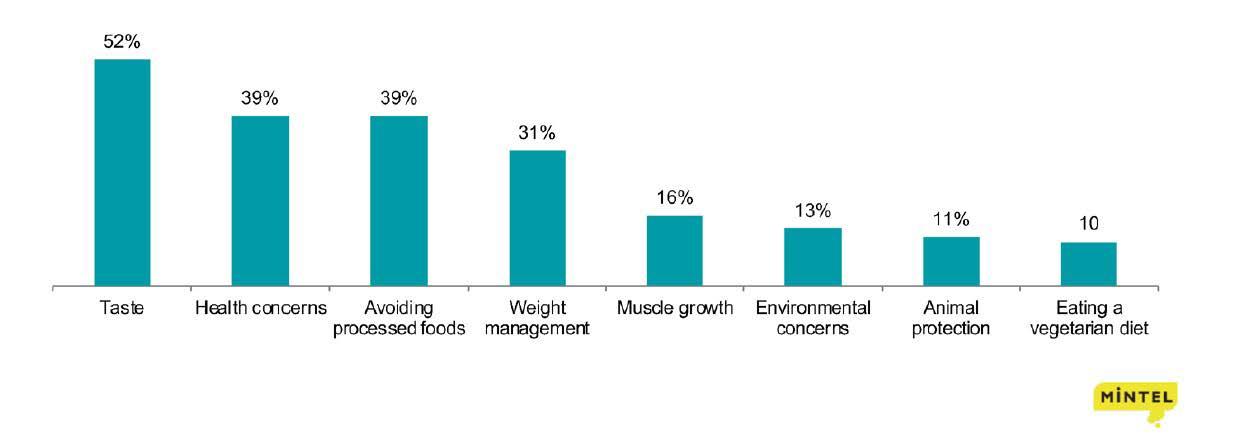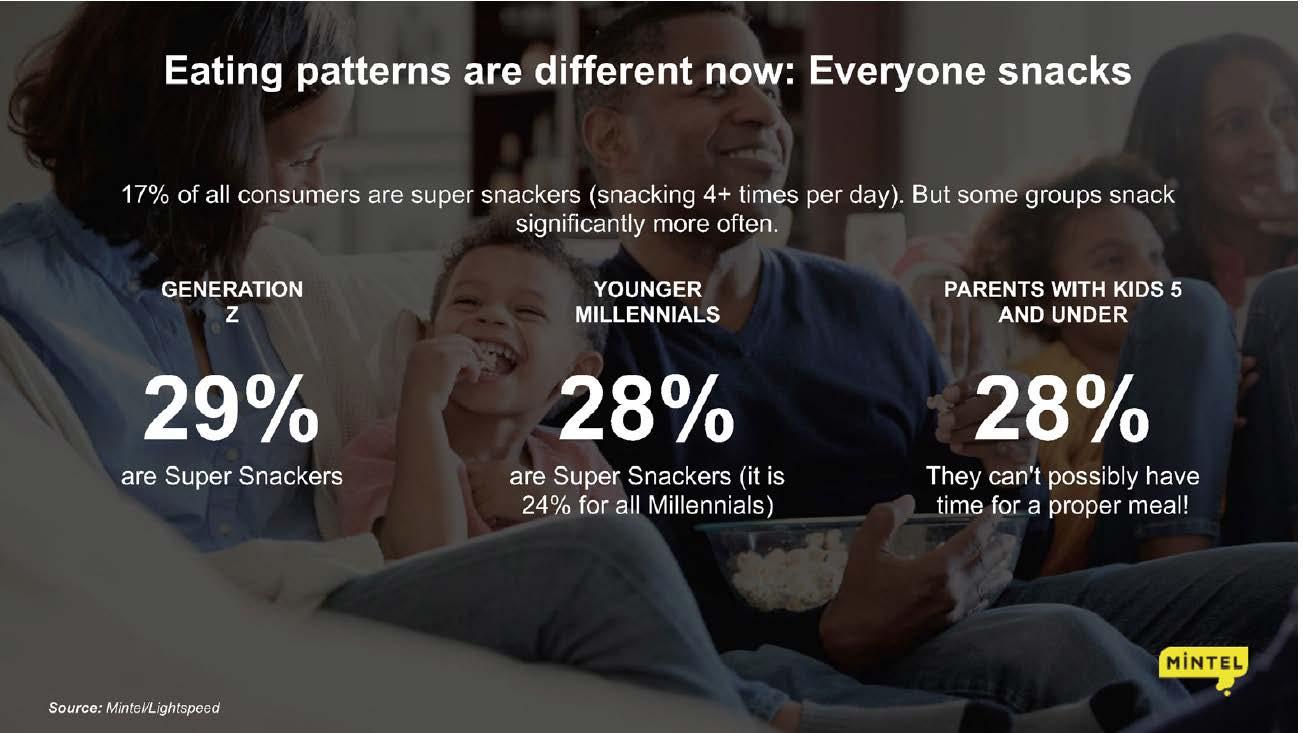
4 minute read
Contents
Plant-based diets What do consumers say?*
Tapping the alternative protein trend
All this is part of an inexorable global trend towards more sustainable consumer behaviour. Some 45% of global consumers say that they have changed their diets in the last two years in order to lead a more environmentally friendly lifestyle (30% in the US, 38% in Europe and 47% in Asia). 2 , 3 Plant-based diets
What do consumers say?* 45% 45% Global How many consumers changed their diets to lead a more environmentally friendly lifestyle in the last 2 years?
38% 38% Europe
What was the main reason for consumers to make changes to their diet?
Source: FMCG Gurus While only 12% of consumers in the US say that they have reduced their meat intake, compared to 35% in Europe, the market for alternative protein sources is set to continue to diversify and grow. 2,3 Source: FMCG Gurus
45% 38% 47% 30% 52% Global consumers say: “I was concerned about the environment overall” 51% of European consumers say: “I was concerned about a specific environmental issue (i.e. global warming)” 57% of Asian consumers say: “I was concerned about the environment overall” 56% of USA consumers say: “I was concerned about a specific environmental issue (i.e. global warming)” 45% Global 38% Europe 47% Asia-Pacific 30% USA 52% Global 51% Europe 57% Asia-Pacific 56% USA 52% 51% 57% 56% What was the main reason for consumers to make changes to their diet? How many consumers changed their diets to lead a more environmentally friendly lifestyle in the last 2 years? How many consumers changed their diet to reduce meat or eliminate it completely? 52% Global consumers say: “I was concerned about the environment overall” 51% of European consumers say: “I was concerned about a specific environmental issue (i.e. global warming)” 57% of Asian consumers say: “I was concerned about the environment overall” 52% Global 51% Europe 57% Asia-Pacific Reduced meat Vegetarian diet 52% 51% 57% 42% Global How many consumers changed their diet to reduce meat or eliminate it completely? How many consumers sometimes find the taste of plantbased food and drink boring? 42% 33%35%33%12% 33% Global 35% Europe 33% Asia-Pacific 12% USA
Lynn Dornblaser, Director Innovation & Insight at Mintel, said during her presentation at Fi North America and SupplySide West 2019, Food ingredients Theater, that protein claims in the US and Europe are going up every year. 1
Reduced meat Vegetarian diet 42% Global 44% Europe How many consumers sometimes find the taste of plantbased food and drink boring? 42% 44% 33%35%33%12% 33% Global 35% Europe 33% Asia-Pacific 12% USA 46% Asia-Pacific How many consumers find plant-based protein sources appealing? 46% 22%19%22%28% 22% Global 19% Europe 22% Asia-Pacific 28% USA Protien claims are up in food and beverage introductions US: Products making a high/added protein claim, 2014-September 2019
22%19%22%28% 22% Global 19% Europe 22% Asia-Pacific 28% USA
46% Asia-Pacific 46% 57% 57% Global 31% USA 31% 58% 56% 50% 58% Europe 56% Asia-Pacific 50% USA
57% 57% Global
58% 58% Europe
56% 50% 56% Asia-Pacific 50% USA
How many consumers find plant-based protein sources appealing? Sources:* 1. FMCG Gurus Sustainability survey – 26,000 consumers surveyed globally – 11,000 Europe, 7,000 Asia-Pacific and 1,000 in the USA, 2019 2. FMCG Gurus Active Nutrition survey – 26,000 consumers surveyed globally – 11,000 Europe, 7,000 Asia-Pacific and 1,000 in the USA, 2019 More insights at https://insights.figlobal.com/
Source: Fi North America and SupplySide West 2019, Food ingredients Theater 1
Sources:* 1. FMCG Gurus Sustainability survey – 26,000 consumers surveyed globally – 11,000 Europe, 7,000 Asia-Pacific and 1,000 in the USA, 2019 2. FMCG Gurus Active Nutrition survey – 26,000 consumers surveyed globally – 11,000 Europe, 7,000 Asia-Pacific and 1,000 in the USA, 2019
She further noted that, when asked why they eat plant-based foods, consumers ranked the taste
experience, health considerations, and a desire to avoid processed foods as the top three key factors. 1

Why do you eat plant-based foods?
Source: Fi North America and SupplySide West 2019, Food ingredients Theater 1
Dornblaser said that this last point can seem unbelievably counter-intuitive.
“One of the things that we have been finding is, consumers choose products
for a lot of different reasons. They live their lives in very complex and
contradictory ways.” 1
Therefore, what consumers are seeking is simplicity. Dornblaser further noted:
“It feels like the consumers look for simple ingredients, clean label in categories
and in the types of foods that they might be able to make themselves.” 1
Consumers are looking for ingredient statements that are easy to understand and, when they seem too
complex, the product is deemed to be too processed. On the other hand, for products consumers are
not able to make themselves, or ones that are able to offer some kind of health benefits or values that are
more ‘of the moment’, the concern for understanding the ingredient statements seem to diminish; which is
what Dornblaser believes have been happening with many of the meat alternatives on the market. 1
In terms of product trends, Dornblaser noted that snacks remain the number one category for making high
protein claims. In part, this is due to changing eating patterns. Nearly everybody snacks; though, this is
especially prevalent among the younger generation. 1






